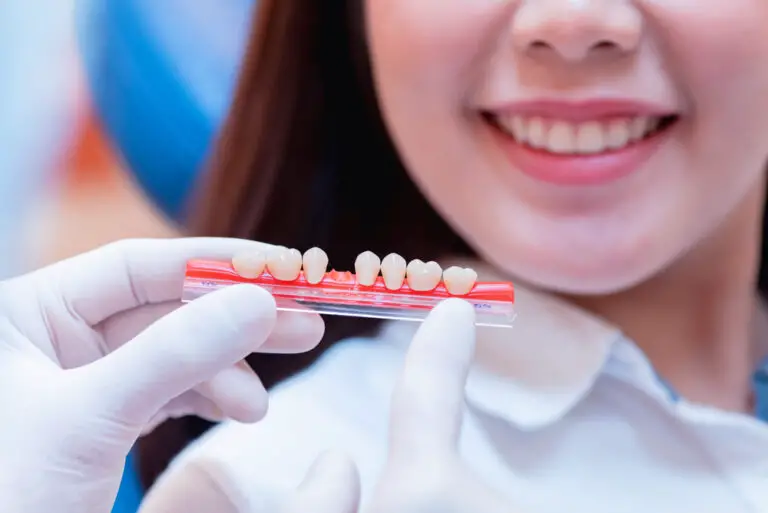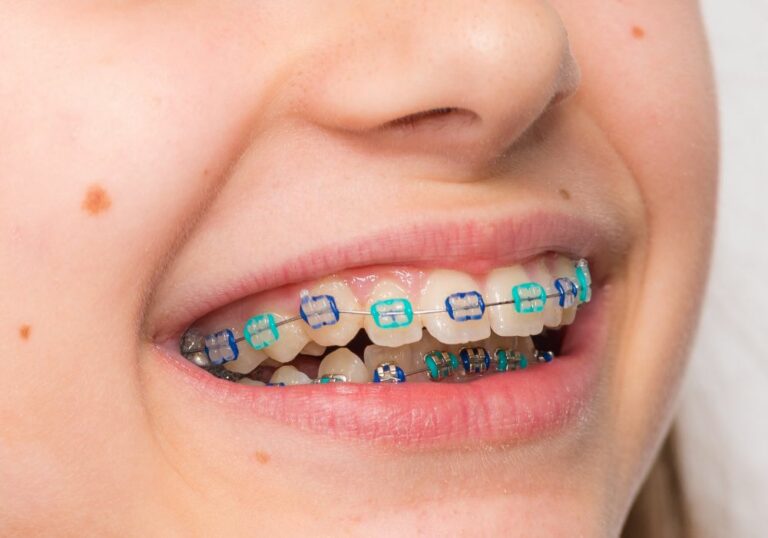Can tinnitus be caused by teeth problems?
Tinnitus, a ringing or buzzing sound in the ears, can sometimes be related to dental problems like teeth grinding, impacted wisdom teeth, and temporomandibular joint (TMJ) disorders. The connection is not fully understood, but some theories suggest that dental issues may put pressure on structures in the ear or nerves that control hearing and lead to tinnitus symptoms. Treating the underlying dental problem often resolves tinnitus.
What is tinnitus?
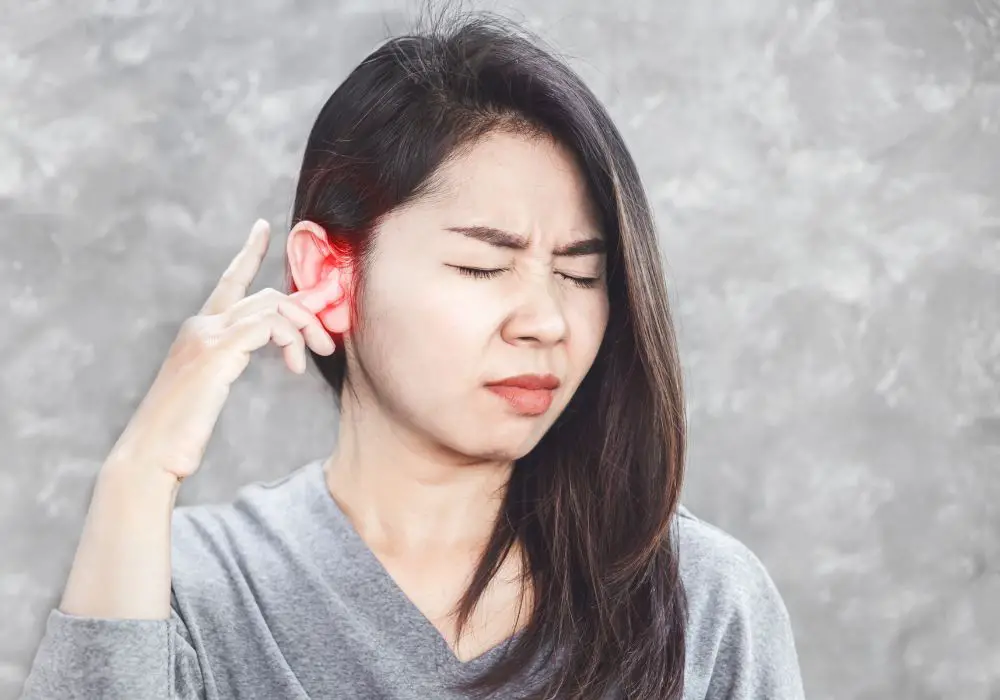
Tinnitus is the perception of noise or ringing in the ears. It’s a common condition that affects about 15 to 20 percent of people. Tinnitus isn’t a condition itself — it’s a symptom of an underlying condition, such as age-related hearing loss, ear injury or a circulatory system disorder.
Although bothersome, tinnitus usually isn’t a sign of something serious. Although it can worsen with age, for many people, tinnitus can improve with treatment. Treating an identified underlying cause sometimes helps. Other treatments reduce or mask the noise, making tinnitus less noticeable.
Tinnitus can be intermittent or constant, with single or multiple tones. The perceived volume can range from subtle to loud. Tinnitus is often associated with some degree of hearing loss, but even people with normal hearing can experience tinnitus. Exposure to loud noises, earwax blockages, ear bone changes, inner ear disturbances and nerve issues can all cause or worsen tinnitus.
Connection between dental problems and tinnitus
There are a few ways that dental problems might contribute to or cause tinnitus:
Teeth grinding (bruxism)
Grinding or clenching teeth, called bruxism, is a common cause of tinnitus. It often happens during sleep, but some people grind or clench their teeth when awake. The activity puts pressure on structures in the ear, including:
- Temporomandibular joint (TMJ) – The hinge connecting the jawbone to the skull. Grinding can strain this joint.
- Muscles and ligaments around the jaw – These connective tissues can spasm and become inflamed from overuse.
- Neck muscles – Grinding can increase neck muscle tension as you clench your jaw. This can compress nerves and blood vessels in the neck.
Grinding may lead to tinnitus symptoms by:
- Straining inner ear structures like the cochlea, which contains sound-sensing cells.
- Irritating the trigeminal nerve, which controls jaw sensation and movement. This nerve runs close to inner ear structures like the cochlea.
- Decreasing blood flow due to muscle tension in the neck and jaw. Inner ear cells are sensitive to changes in blood flow. Reduced circulation can impair their function.
People may be more likely to grind their teeth or clench their jaw in response to stress. The constant tension put on the jaw joint and surrounding tissues from regular grinding may lead to inflammation that irritates the nerves controlling hearing.
TMJ disorders
Problems with the temporomandibular joint itself can also cause tinnitus or make existing tinnitus worse. TMJ disorders happen when the joint connecting the jaw to the skull becomes damaged or misaligned. Signs and symptoms include:
- Pain in front of the ear, jaw, or inside the ear.
- Jaw locking, clicking, or popping when opening or closing the mouth.
- Limited ability to open or close the mouth.
- Headaches or neck pain.
TMJ disorders put pressure on various nerves, muscles, and blood vessels in the head and neck region, which may lead to tinnitus symptoms. Grinding teeth often co-occurs with TMJ disorders and makes symptoms worse.
When the temporomandibular joint is inflamed, strained or compressed, this can irritate the auriculotemporal nerve that runs under the joint and extends to the ear. Misalignment of the jaw may also disrupt blood flow to structures in the inner ear. These effects may trigger or exacerbate ringing or buzzing sounds perceived in one or both ears.
Impacted wisdom teeth
Impacted wisdom teeth may trigger tinnitus in some cases. Third molars that don’t have room to emerge fully can press against nerves, gums, and other teeth as they try to break partially through the gums. Even if impacted wisdom teeth aren’t painful, the pressure on surrounding tissues could be enough to irritate nerves that control hearing and lead to tinnitus.
The inferior alveolar nerve, which gives sensation to the lower teeth, chin and lip, sits very close to the lower wisdom teeth. Attempted emergence or growth of impacted third molars can put pressure on this nerve. This irritation could potentially radiate to the inner ear and cause tinnitus symptoms.
Diagnosing dental-related tinnitus
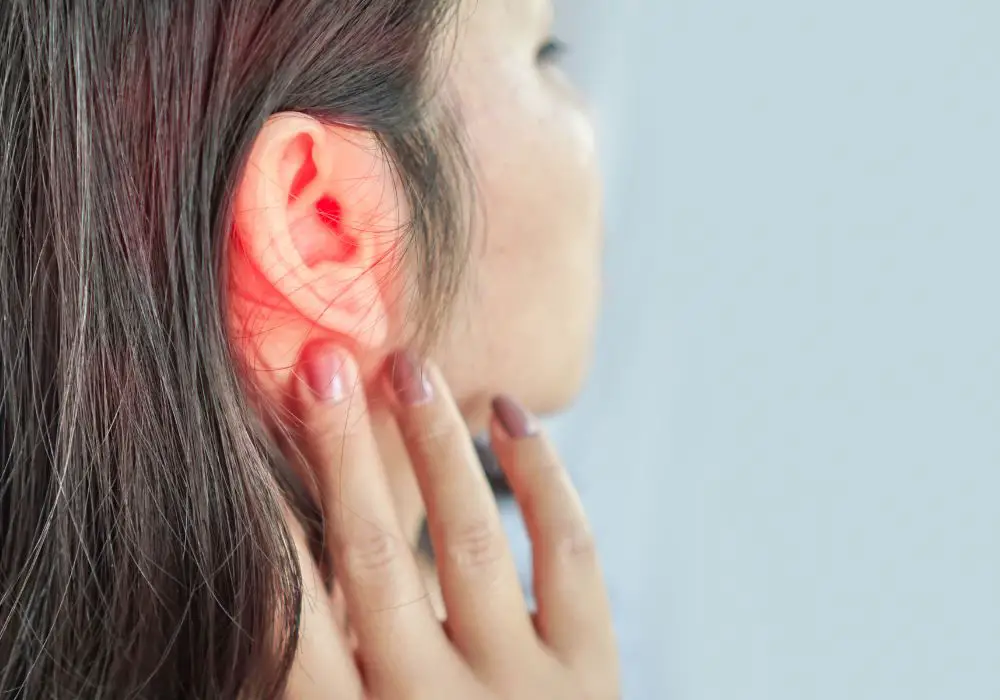
If you develop tinnitus symptoms, ask your dentist and doctor to check for dental problems that could be contributing. Signs that tinnitus may be related to dental issues include:
- Onset of ringing in the ears around the same time as dental symptoms like tooth pain.
- Tinnitus or ear pain while chewing food.
- Ear pain, sore jaw muscles, or neck pain along with tinnitus.
- Worsening tinnitus after drinking alcohol or caffeinated beverages, which can increase teeth grinding.
- Discovering signs of bruxism like flattened tooth enamel or a sore, tired jaw in the morning.
Your dentist can check for:
- Teeth grinding – Worn, cracked, or chipped tooth enamel. Jaw tenderness or pain.
- TMJ disorders – Clicking, locking jaw. Pain with chewing. Limited mouth opening. Misaligned bite.
- Impacted wisdom teeth – Partially visible third molars. Redness or swelling of the gums near an impacted tooth. Difficulty brushing or flossing back molars.
A doctor may also do a physical exam of your jaw and ears. Imaging tests like X-rays, CT scans or MRIs can help confirm dental problems and TMJ disorders. Your doctor will also check for other possible causes of tinnitus like medication side effects or hearing loss.
Treating dental-related tinnitus
If your dentist finds a dental issue that could be causing tinnitus, treating the underlying problem may help reduce ear noise and other symptoms.
Fixing teeth grinding
Options to reduce bruxism and relieve tinnitus may include:
- Dental guard – A custom mouthguard worn at night cushions teeth from grinding. This prevents damage to tooth enamel and jaw joints.
- Medications – Muscle relaxants like cyclobenzaprine or anticonvulsants like gabapentin can help stop clenching. Sedatives or antidepressants may also work.
- Botox – Botox injections into the jaw muscles may reduce strain and tension by temporarily paralyzing muscles. Effects last about 3 months.
- Physical therapy – Stretching exercises help relieve jaw and neck muscle tension. Massage, heat/cold therapy, and transcutaneous electrical nerve stimulation can relax muscles.
- Stress reduction – Strategies like cognitive behavioral therapy, meditation, counseling, and relaxation techniques can help reduce teeth grinding from stress.
| Treatment | How It Helps |
|---|---|
| Dental guard | Prevents wearing down teeth at night from grinding |
| Muscle relaxants, sedatives | Reduce clenching and muscle tension |
| Botox | Temporarily paralyzes jaw muscles |
| Physical therapy | Stretches tight jaw and neck muscles |
| Stress reduction | Lowers teeth grinding caused by anxiety or stress |
Correcting TMJ disorders
Treatments for TMJ disorders include:
- Medications – Over-the-counter pain relievers, anti-inflammatories like ibuprofen, muscle relaxants like cyclobenzaprine, antidepressants, or corticosteroid injections can relieve joint pain and pressure.
- Night guard – A splint or mouthguard limits grinding and clenching to decrease joint strain.
- Physical therapy – Exercises strengthen jaw muscles and improve range of motion. Heat/ice therapy reduces inflammation. Massage can help relax muscles.
- Surgery – Corrective procedures realign the jaw or repair joint damage. This is rare and done for severe, chronic TMJ disorders.
Relieving pressure and inflammation in the temporomandibular joint alleviates irritation to nerves that control hearing and often reduces tinnitus from TMJ problems. If conservative treatments don’t provide enough relief, surgical options like arthrocentesis to flush the joint or arthroscopic surgery may be recommended.
Removing wisdom teeth
Extracting impacted wisdom teeth can sometimes resolve tinnitus symptoms caused by pressure on ear structures. A dentist, oral surgeon or ENT doctor removes problematic third molars in an outpatient procedure, often with local anesthesia. Sedation may be an option for more anxious patients.
After wisdom tooth extraction, the gums are stitched and will take a week or two to fully heal. Pain, swelling and bruising are common for several days after surgery. Tinnitus often improves once the teeth are removed and inflammation goes down. However, it could take several months for symptoms to completely resolve after wisdom tooth extraction.
When to see a doctor
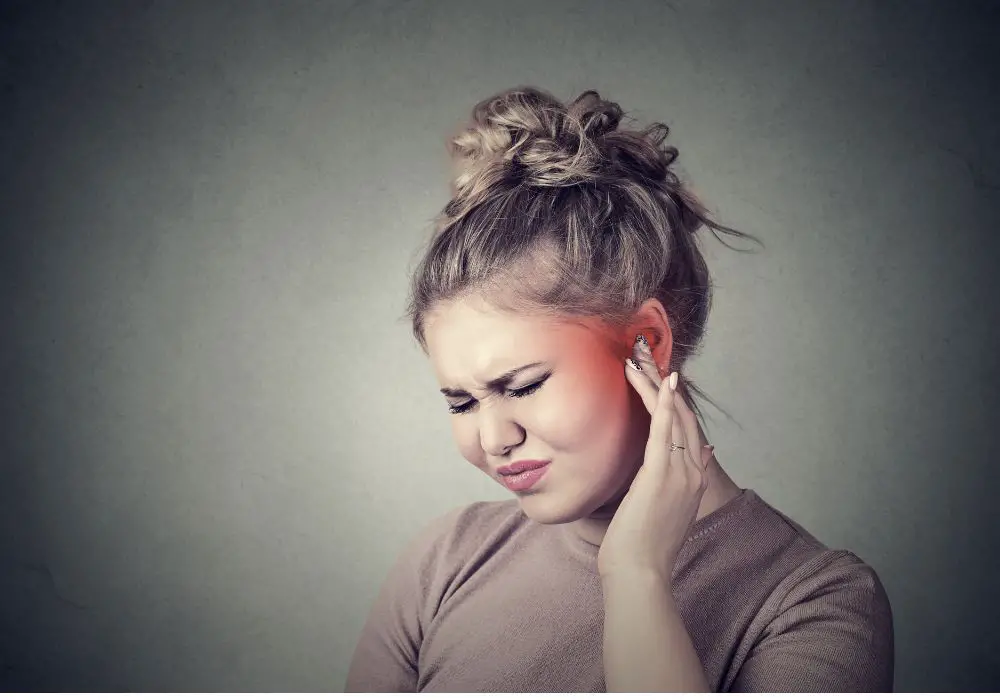
See your doctor if persistent tinnitus:
- Occurs suddenly or without an apparent cause
- Happens along with other worrisome symptoms like dizziness, vision changes or hearing loss
- Makes it difficult for you to sleep, concentrate, or hear conversations
- Does not improve with dental treatment
In these cases, tinnitus may be unrelated to dental problems and require different medical evaluation and management. Imaging tests and hearing exams will be needed to identify the cause. Sudden tinnitus can signify an inner ear condition like Meniere’s disease and needs urgent medical care to prevent permanent hearing loss.
Frequently asked questions
Here are answers to some common questions about tinnitus and dental problems:
Does teeth grinding always cause tinnitus?
No, not everyone who grinds their teeth develops tinnitus. But there is a recognized link between bruxism and increased risk for ear noise. Up to 80% of people with temporomandibular joint dysfunction experience tinnitus. The reasons teeth grinding seems to trigger tinnitus in some people are not fully understood. The degree of nerve irritation or inflammation in jaw muscles may play a role. Age and genetics may also factor in to who develops tinnitus.
Can tinnitus be permanent from dental issues?
In most cases, tinnitus caused by dental problems is not permanent. Ringing, buzzing and other noises typically go away once the source of pressure or irritation to auditory structures is relieved. However, if dental issues like TMJ or bruxism are left untreated for a long period of time, the resulting strain on nerves and blood vessels can potentially lead to lasting inner ear damage and chronic tinnitus. The longer tinnitus goes on, the harder it may be to eliminate the perceived sounds.
Can braces or dental work cause tinnitus?
New dental work like braces, crowns or tooth extractions doesn’t often directly lead to tinnitus. But if orthodontic appliances or changes to tooth alignment make you clench or grind your teeth more intensely, this could indirectly worsen tinnitus by increasing pressure on the jaw joint or nearby nerves. Let your dentist know if you develop ringing ears after getting braces, a crown, or other dental procedures. Adjustments can be made to relieve abnormal biting forces.
If I grind my teeth, will treating this stop my tinnitus?
Not necessarily. Teeth grinding is just one potential cause of tinnitus. Treating bruxism may or may not improve your ear noise. Tinnitus often has multiple contributing factors. But pursuing dental treatment for grinding is still worth trying, since resolving this mechanical source of nerve irritation offers a chance for tinnitus relief for some patients. The benefits are greater the sooner grinding is addressed.
Can a night guard worsen tinnitus?
Rarely, some people report their tinnitus initially gets louder when they start using a night guard. This could be due to awareness and adjustment to having the guard in your mouth. Any worsening is typically temporary. Within 1-2 weeks of consistent use, a properly fitted dental night guard often helps protect teeth from grinding damage and reduces tinnitus. Inform your dentist if a night guard seems to aggravate your symptoms so adjustments can be made.
In summary, dental disorders like teeth grinding, TMJ dysfunction, and impacted wisdom teeth can sometimes trigger tinnitus by straining inner ear structures or nerves that influence hearing. Treating the underlying dental condition provides relief for tinnitus in many cases. Work with your dentist and doctor to identify any dental issues contributing to your ear noises, and address these appropriately to reduce tinnitus symptoms. The sooner treatment begins, the more likely the ringing will resolve.

